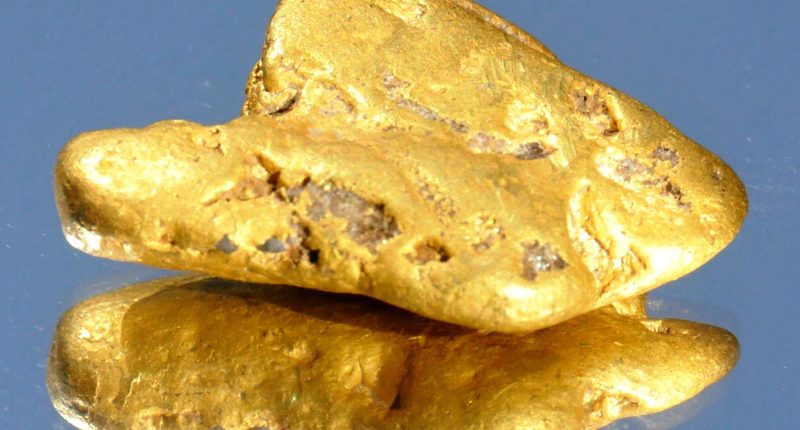A MAN who went on a treasure hunt in the countryside was stunned to find a massive gold nugget worth a whopping £30k in just five minutes.
Richard Brock, 67, got the shock of his life when he joined an expedition in the Shropshire Hills.
Having travelled up from his home in Devon to join the expedition, Richard found that on arrival he had difficulty with his detecting kit.
It meant he had to resort to using an old machine that was not working properly.
But moments later Richard had discovered the biggest find of his life.
Within five minutes of setting up his equipment, he’d unearthed the largest gold nugget ever discovered in England.
Read More in Money
The huge jackpot is worth an estimated £30,000.
“It just goes to show that it doesn’t really matter what equipment you use, if you are walking over the find and are alert enough to what might be lurking underneath the soil, that makes all the difference,” he commented.
Just what a gold nugget was doing in the Shropshire Hills is a mystery.
But parts such as the Wenlock Edge are an ancient landscape which was once under a prehistoric ocean and hunters often find remnants of coral in the area.
Most read in Money
It is also true that in the area there was a large amount of rock which originally came from Wales – a country known to be rich in gold.
Now leading auctioneers Mullock Jones is offering the nugget for sale in a timed auction with an estimate of £30,000.
Retired cameraman Richard added: “Upon doing some research, we could only find bigger than this in Wales and Scotland.
“The last one which claimed to be bigger in England was 54 grams but mine is 64.8 grams, so we’re pretty confident its the biggest found on English soil.
“I did contact the finds liaison officer and they were happy for me to do with it what I wanted, so I thought I would try selling it at auction.
“I’m going to split whatever it sells for with the land owner. I found it last May but I’ve only recently learned it could be the biggest – it is quite incredible really.”
Richard’s discovery was made on a site believed to have been an old track or road with railway lines running through, containing stone possibly distributed from Wales.
The only previous bigger examples in Britain have been found in either Wales and Scotland.
The Douglas Nugget found in Perthshire weighed 85.7g, another from the shores of Anglesey weighed 97.12g and The Reunion Nugget found in Scotland in 2019 weighed 121.3g.
What to do if you find treasure?
Under the UK’s 1996 Treasure Act, finders of potential treasure are obligated to report their discoveries to the local coroner within a timeframe of 14 days.
The British Museum’s Portable Antiquities Scheme works to advise treasure finders of their legal obligations alongside writing reports for coroners on each individual discovery and running the administration for the Treasure disclamation process.
The Treasure Act facilitates the purchasing of finds by both national and local museums for the public benefit — with a reward from such typically given and split between the finder and the landowner.
The size of the rewards are equal to the full market value of the finds, as determined by the Secretary of State, following guidance from an independent panel of experts called the ‘Treasure Valuation Committee’.
The act also helps to guide what is and isn’t considered as treasure — with the final determination for individual items made at an inquest.
At present, the following, for example, are defined as treasures:
- Finds of two of more 300-years-or-older coins from the same location, unless they contain less than 10 per cent gold or silver, in which case there must be at least 10 in the find to qualify as a treasure.
- Two or more prehistoric base metal objects found in association.
- Any non-coin artefact that is at least 300 years old and contains at least 10 per cent gold or silver.
- Any object found in the same place as another treasure.
- Deliberately hidden objects whose owners or heirs are unknown that are less than 300 years old but are made predominantly of gold or silver.
However, following a public consultation, a new definition is to be developed in the future — one which will account for the cultural and historical significance of a find, rather than just its material qualities.
It comes after a dad who found a 400-year-old falconry ring once owned by King Charles I is set to sell the precious item for an eye-watering sum.
The tiny hawking ring, found in a spoil heap by the Thames by metal detectorist Roy Davis in the 1980s, lay untouched in an attic for nearly 40 years.
Lucky owner Roy only realised its royal origin after cleaning it four decades after he first discovered it.
Meanwhile, another metal detectorist found a hoard of 400-year-old silver coins, on only his second outing.
The boiler engineer stumbled on the precious collection using a metal detector he bought on Amazon for £150.
Plus, one rookie treasure hunter managed to locate one of the largest ever hauls of pre-Viking gold.
READ MORE SUN STORIES
The huge fortune – including gold medallions as big as saucers – lay hidden for 1,500 years until Ole Ginnerup Schytz found it by “pure luck”.
Ole had only been out for a few hours when he heard his gadget beep in a field and unearthed 22 precious gold objects weighing almost 1kg (2.2lbs).
This post first appeared on thesun.co.uk














